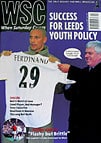 Tony Cascarino's exceptional autobiography tells some harsh truths about himself and about players' lives, says Dave Hill
Tony Cascarino's exceptional autobiography tells some harsh truths about himself and about players' lives, says Dave Hill
Oh boy. Hark at this: “It has often been said that the joy of scoring goals is greater than sex but personally I’d compare it more with masturbation. I’ve always found sex to be an absolute pleasure, but scoring goals has only ever brought relief.” The search for relief – by foot rather than by hand – and the misery of not finding it, is the key theme and metaphor of this book: a book which, at its best, is almost unbearable.
“Fifty thousand Celtic fans jump to their feet… They see Tony Cascarino slipping his marker and breaking free. They see the winger cross the ball low to the striker’s feet. They see a million pound player in front of an open Rangers goal with a glorious opportunity at his feet…They do not see the fear on my face at that moment. They do not believe their eyes when I swipe frantically and completely miss the target. They do not feel compassion when I fall to my knees and cover my face in shame.”
There are lots of other voices in Full Time. There’s the voice of Jack Charlton, for example, explaining to Cascarino why he had dropped him from the Ireland team after a poor showing in training: “You were fucking crap!” Ken Bates gets a word in: “I don’t want another fucking disaster like Cascarino.” And then there’s Liam Brady, his manager at Celtic: “What the fuck is going on, Tony? You were a disaster! I’ve never seen you play so badly!” A Celtic fan, too, makes this fragrant contribution: “You’re fucking shit, you. You’re a useless big bastard.”
But most vividly of all there is the little voice of doubt inside the striker’s own head. Here it is January 1984, when Cascarino, playing for his first club Gillingham, bears down on Neville Southall in the last extra-time moments of an FA Cup replay, with no Everton defender for miles around, the score 0-0, and giant-killing glory within his grasp:
“Any striker worth his salt will put this ball in the net.”
“Yeah but…”
“This is your big chance.”
“It’s not as easy as it looks, you know.”
“You’re shitting yourself, aren’t you?”
“No, I…”
“You’re going to miss.”
He did. It was a miss he would relive a thousand times, a miss captured by television cameras and re-shown over and over as one of the great misses, a miss that probably helped save Howard Kendall’s job, as the then Everton manager reminds Cascarino every time they meet.
The news angle on this book has been its revelation that Cascarino was never actually qualified to play for Ireland: only later did he discover that his mother – maiden name O’Malley – had been mistaken in her belief that her parents had been born in the Republic thereby entitling her son to pull on the green shirt. But the real story here is that a professional footballer has given us a look at his own soul and with it the soul of the game he played until his hair was turning grey and his knees could take no more.
The publishers describe Full Time as “a football autobiography that reads like a novel” and they’re not far wrong. The nearest thing to it that I have read previously is an unjustly forgotten pre-soccerati novel called Striker by Michael Irwin, a professor of English. Its fictional anti-hero, one Vin Gilpin, had much in common with Cascarino: chronic crises of confidence, failures of form and attitude he couldn’t understand, a sporting life of drift and gloom as well as some rich rewards.
Full Time tells of good times: up front with Sheringham at Millwall, adventures with the Irish, his strange Indian summer in France with Marseille and Nancy. The dominating mood, though, is of pathos and regret. Cascarino looks back ruefully at boozy indiscretions, the card schools, the lure of BMW catalogues, the two million quid in earnings he has somehow frittered away. But there is much, much more than just the hazy self-pity of a fading athlete afraid of facing up to the remainder of his life.
He reflects candidly on his sexual infidelities and the resulting distance between himself and his two sons. He looks back on his own childhood, his unhappy family, his love for his mother, the brutal beatings he endured from his father. And he provides telling insights into dressing room cultures where players inspire and police each other to remain in a state of permanent puerility, often stupid, sometimes poisonous, but so seductive nonetheless. What was there to do except join in?
Cascarino’s openness is exceptional and welcome. So too is the way he appears to have worked with journalist Paul Kimmage, chief sportswriter with Ireland’s Sunday Independent. Even the best “ghost job” football memoirs reflect master-servant relationships between the star and the hack, who is generally obliged to put PR before the truth. Full Time, by contrast, has the refreshing feel of a true collaboration; the player provides the anecdotes, the experiences, the emotions, the writer weaves them into a prose that does them proper justice. If only all books about football men were even half this good.
From WSC 167 January 2001. What was happening this month